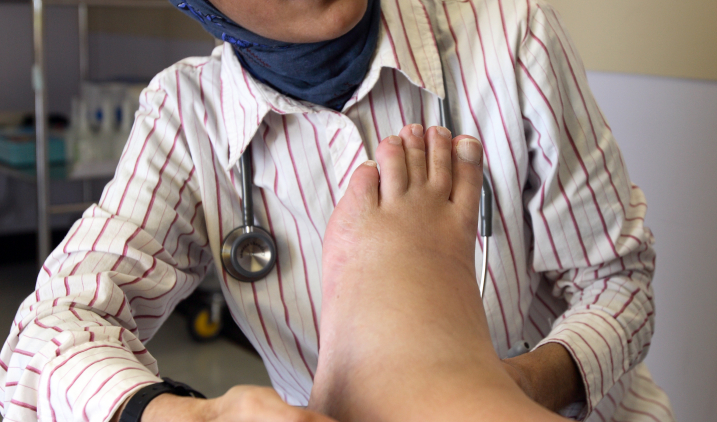Rheumatology
Rheumatologists are doctors who diagnose and manage chronic inflammatory conditions such as rheumatoid arthritis. Rheumatic conditions can affect people at any age.
Those under 16 are generally treated in paediatric rheumatology services, before starting to transition to care within adult rheumatology settings.

Life as a rheumatologist
You’ll treat people with:
- inflammatory joint disease, for example rheumatoid arthritis, psoriatic arthritis, ankylosing spondylitis
- degenerative joint disease, for example osteoarthritis
- autoimmune disease, for example lupus, scleroderma, myositis
- metabolic bone disorders, for example osteoporosis
- crystal arthropathies, for example gout or pseudogout
- musculoskeletal infections
Rheumatologists work to improve the lives of children and adults with rheumatic and musculoskeletal disease. You’ll spend quite a bit of time in outpatients speaking to and examining patients and undertaking investigations such as plain x-rays, ultrasound scans and MRI scans.
You’ll see inpatient referrals from all over the hospital.
Many rheumatologists do practical procedures such as joint injections and/ or muscle biopsies.
How much can I earn?
You’ll first earn a salary when you start your foundation training after medical school. The basic salary ranges from £32,398 to £37,303. Once you start your specialty training in the NHS, you can expect to earn a salary of at least £43,923, which can increase to between £93,666 and £126,281 as a consultant.
How about the benefits?
- make a difference
- flexible and part-time working
- high income early in your career
- work anywhere in the world
- excellent pension scheme
- good holiday entitlement
- NHS discounts in shops and restaurants
Must-have skills
- excellent communication skills to manage a wide range of relationships with colleagues, and patients and their families
- emotional resilience, a calm temperament and the ability to work well under pressure
- teamwork and the capacity to lead multidisciplinary teams
- problem-solving and diagnostic skills
- outstanding organisational ability and effective decision-making skills
- first-class time and resource management for the benefit of patients
Entry requirements
Your first step is medical school. Typically, you’ll need excellent GCSEs and three A or A* passes at A level including chemistry for a five-year undergraduate degree in medicine. Many medical schools also ask for biology and others may require maths or physics.
If you already have a degree, you could study for a four-year postgraduate degree in medicine.
You’ll need to pass an interview and admissions test. You’ll be asked to show how you demonstrate the NHS values such as compassion and respect.
Some medical schools look to recruit a mix of students from different backgrounds and geographical areas, so your educational and economic background and family circumstances could be considered as part of your application.
What are my chances of starting a career as a rheumatologist?
There are approximately 699 rheumatologists working in the NHS in England. In 2020, there were 199 applications for 33 specialty training places.
How to become a rheumatologist
After medical school, you’ll join the paid two-year foundation programme where you’ll work in six placements in different settings.
After your foundation programme, you can apply for paid specialty training to become a rheumatologist, which will take a minimum of seven years.
You may be able to train part time, for example for health reasons or if you have family or caring responsibilities.
Where a career as a rheumatologist can take you
- paediatric rheumatology
- metabolic bone disease
- autoimmune multi-system connective tissue diseases
You may also have opportunities to conduct research or take on education and leadership roles.